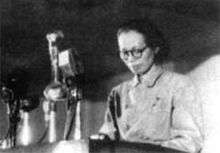Xie Xuehong

Xie Xuehong (Chinese: 謝雪紅; 17 October 1901 – 5 November 1970) was a Taiwanese–Chinese politician. A women's rights activist, she cofounded the Taiwanese Communist Party and believed that “Taiwan must be ruled by Taiwanese." Persecuted by the Kuomintang, she escaped to the mainland, where she became a member of the Taiwan Democratic Self-Government League and the Communist Party of China.
Biography
Xie was born in Changhua County in 1901 to a working class family, the fourth of seven children.[1] She assumed at least seven other names throughout her lifetime. At the age of twelve, she moved in with another family. Her adoptive family was abusive, and, instead of entering an arranged marriage with their son, Hong Xinhu, she left their home. Xie met and married Zhang Shumin in 1918. For a time, the couple lived in Kobe, Japan, where the Taishō period of democracy heavily influenced Xie. Soon after Xie and Zhang moved to China, the couple split, as Xie had discovered that Zhang was still married to another woman. Xie then began to give sewing lessons, while also making and selling clothes. The May Fourth Movement was a political turning point for Xie, and she later joined Chiang Wei-shui's resistance against Japanese rule. Xie studied sociology at Shanghai University and took part in the May Thirtieth Movement before moving to Moscow for further education. In 1927, she returned to China and helped found the Taiwanese Communist Party. Xie's ideology spread to Chiang's Taiwanese People's Party and Taiwanese Cultural Association after she took on leadership positions in the two groups. She believed that a maintaining a distinct Taiwanese identity and allowing bourgeoisie to participate would allow communism to flourish in Taiwan. Others disagreed and Xie was expelled from the Taiwanese People's Party in 1931. Later that year, she was arrested and sentenced to 13 years imprisonment for advocating communism. In 1939, Xie was released after catching tuberculosis.[2][3]
Xie returned to political activism in 1945, when Kuomintang forces arrived in Taiwan, stating that “Taiwan must be ruled by Taiwanese.” She led resistance to the February 28 Incident from her home base in Taichung, telling her followers, known as the 27 Brigade, not to damage property or injure anyone. Three weeks later, she escaped to Xiamen. In China, Xie continued to push for Taiwan's right to self-determination, views for which the Chinese Communist Party targeted her during the Anti-Rightist Movement. Xie died in Beijing in 1970, a victim of the Cultural Revolution. She was posthmously rehabilitated by the Communist Party of China in 1986.[3][4][5]
References
- ↑ Lee, Lily Xiao Hong (2003). 中國婦女傳記詞典: The Twentieth Century, 1912-2000. M.E. Sharpe. p. 591. ISBN 9780765607980.
- ↑ Chen, Ya-chen (October 2012). "Taiwanese Communist Feminist, Xie Xuehong: Li Ang's Literary Portrait of Xie Xuehong's Pre-1949 Feminist Activism in Taiwan" (PDF). American Journal of Chinese Studies. 19 (2): 119–126. Archived from the original on October 2012.
- 1 2 Han Cheung (2 October 2016). "Taiwan in Time: A leftist under three regimes". Taipei Times. Retrieved 2 October 2016.
- ↑ Blanchard, Ben (27 February 2007). "China tries to reclaim Taiwan political heroine". Reuters. Retrieved 2 October 2016.
- ↑ Lee, Lily Xiao Hong (2016). Biographical Dictionary of Chinese Women: v. 2: Twentieth Century. Routledge. pp. 648–649. ISBN 9781315499239.
| Party political offices | ||
|---|---|---|
| New title | Chair of the Taiwan Democratic Self-Government League 1949—1958 |
Next: Cai Xiao |